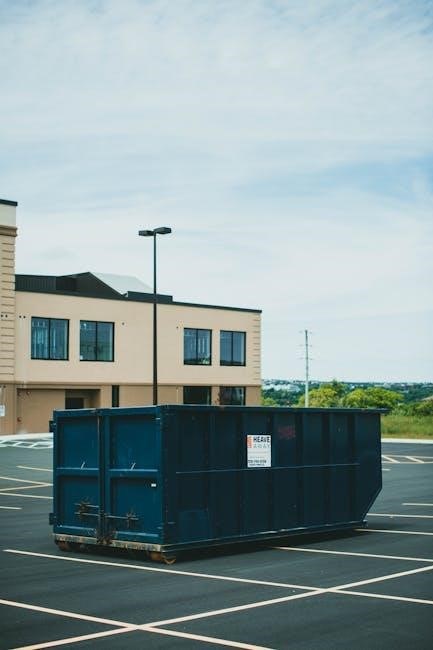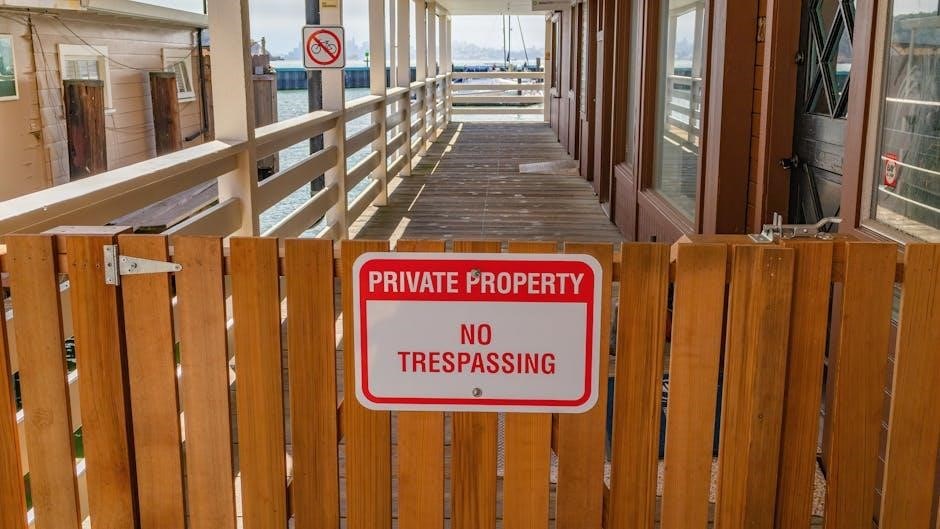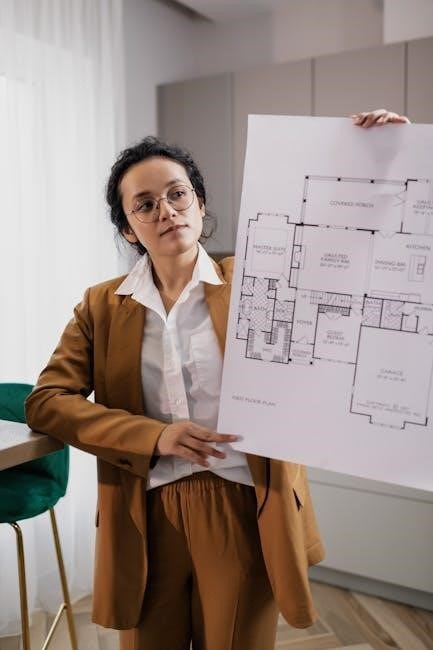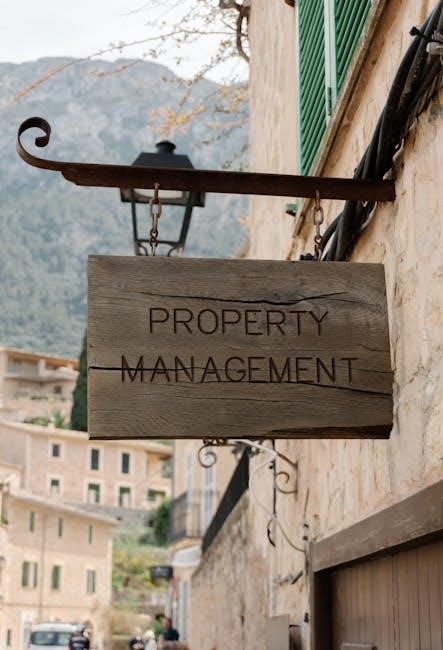Property management involves overseeing various tasks, including tenant screening, rent collection, maintenance, and legal compliance. It also requires financial oversight and effective communication to ensure property value and tenant satisfaction.
Overview of Property Management
Property management encompasses a broad range of activities aimed at maintaining and enhancing the value of real estate properties. It involves managing day-to-day operations, such as tenant relations, maintenance, and financial transactions. Property managers act as intermediaries between property owners and tenants, ensuring that properties are well-maintained, legally compliant, and financially viable. Their responsibilities include screening tenants, collecting rent, handling repairs, and conducting regular inspections to ensure safety and upkeep. Effective property management also involves budgeting, accounting, and adhering to landlord-tenant laws. By overseeing these tasks, property managers play a crucial role in maximizing property value and ensuring tenant satisfaction.
Importance of Understanding Property Management Duties
Understanding property management duties is crucial for ensuring legal compliance, tenant satisfaction, and financial stability. Property managers must grasp their responsibilities, such as tenant screening, rent collection, and maintenance, to avoid legal disputes and financial losses. Clear knowledge of these duties helps in mitigating risks, such as non-compliance with safety regulations or improper eviction processes. It also fosters positive tenant relations, which are essential for long-term occupancy and property value retention. By comprehending their role, property managers can effectively handle repairs, budgeting, and lease agreements, ensuring smooth operations and maximizing property potential.

Tenant Management Responsibilities
Tenant management involves screening applicants, collecting rent, addressing complaints, and maintaining positive tenant relations. It ensures tenant compliance with lease terms and fosters a harmonious living environment.
Screening Potential Tenants
Screening potential tenants is a critical responsibility in property management, ensuring reliable and trustworthy occupants. This process involves background checks, credit history reviews, employment verification, and rental history assessments. Proper screening helps minimize risks such as unpaid rent or property damage. Property managers must evaluate applicants fairly, adhering to anti-discrimination laws. They also review references and conduct interviews to assess suitability. Effective tenant screening fosters a positive rental experience and protects the property’s value. By identifying qualified tenants, managers can reduce potential conflicts and maintain a stable rental environment. Thorough screening is essential for long-term tenant relationships and property success.
Rent Collection and Payment Management
Rent collection and payment management are essential duties for property managers, ensuring consistent cash flow and financial stability. Managers establish payment systems, track rent due dates, and handle late payments. They maintain detailed records of all transactions, providing receipts and statements to tenants. Property managers also enforce payment policies, addressing overdue rents and resolving disputes. Additionally, they oversee security deposits, ensuring compliance with legal requirements. Effective rent management helps maintain positive tenant relationships and supports the property’s financial health. Proper documentation and timely communication are critical to avoiding delays and ensuring smooth transactions, making this a cornerstone of successful property management.
Handling Tenant Complaints and Issues
Property managers must address tenant complaints and issues promptly to maintain satisfaction and ensure a positive living environment. This involves listening to concerns, investigating problems, and resolving them fairly and efficiently. Managers must remain professional, communicate clearly, and ensure all actions comply with legal standards. They also mediate disputes between tenants and address any unauthorized use of property. Documentation of complaints and resolutions is crucial for accountability and future reference. Effective handling of tenant issues fosters trust and long-term tenant retention, making it a critical aspect of property management duties.

Maintenance and Repair Duties
Property managers handle repairs, schedule inspections, and work with contractors to maintain property condition. They ensure timely resolutions to maintenance requests, preserving the property’s value and tenant satisfaction.
Handling Repairs and Maintenance Requests
Property managers are responsible for addressing and resolving maintenance and repair requests promptly. They assess the urgency of each issue, prioritize tasks, and coordinate with contractors or vendors to ensure timely and cost-effective solutions. Managers must communicate clearly with tenants regarding the status of repairs and expected timelines. They also oversee the quality of work to maintain property standards and tenant satisfaction. Proper documentation of all maintenance activities is essential for record-keeping and future reference. By managing repairs efficiently, property managers help preserve the property’s value and ensure a safe and comfortable living environment for tenants.
Regular Property Inspections
Regular property inspections are a critical part of property management, ensuring the property remains in good condition and meets safety standards. Inspections help identify potential issues early, preventing minor problems from escalating into major repairs. Property managers conduct systematic evaluations of buildings, grounds, and common areas to check for structural integrity, needed repairs, and safety hazards. These inspections also ensure compliance with local regulations and maintain the property’s value. By addressing issues promptly, property managers protect the investment and provide a safe, well-maintained environment for tenants. Regular inspections are a proactive approach to preserving the property and ensuring long-term sustainability.
Working with Contractors and Vendors
Property managers are responsible for coordinating with contractors and vendors to ensure timely and cost-effective maintenance and repairs. This involves selecting reliable professionals, negotiating contracts, and monitoring the quality of work. Managers must verify that all contractors are licensed, insured, and comply with local regulations. They also handle payment processing and ensure that services are delivered within budget. Building strong relationships with vendors is crucial for securing favorable terms and prioritizing urgent repairs. Effective communication and oversight are essential to ensure that property standards are maintained and tenant satisfaction is upheld. This role requires balancing cost efficiency with quality to protect the property owner’s investment.

Legal and Compliance Responsibilities
Property managers must understand and adhere to landlord-tenant laws, ensuring compliance with safety regulations and fair housing practices. They manage lease agreements and legal documentation to minimize risks and ensure operations align with local and federal regulations.
Understanding Landlord-Tenant Laws
Property managers must understand landlord-tenant laws to ensure compliance and avoid legal disputes. These laws govern lease agreements, eviction processes, and tenant rights, varying by jurisdiction. Key areas include fair housing practices, security deposit regulations, and eviction procedures. Staying updated on local and federal regulations is crucial to maintain legal compliance and protect both tenants and property owners. Misunderstanding these laws can lead to legal pitfalls, emphasizing the importance of proper training and consultation with legal experts when necessary. Compliance ensures fair treatment of tenants and safeguards property owners from potential liabilities, fostering a positive and legally sound rental relationship.
Ensuring Compliance with Safety Regulations
Property managers must ensure properties comply with safety regulations to protect tenants and avoid legal risks. This includes conducting regular fire safety inspections, ensuring emergency exits are accessible, and maintaining functional smoke detectors and carbon monoxide alarms. Electrical systems, plumbing, and heating must also meet safety standards. Managers are responsible for addressing hazards promptly and providing clear safety guidelines to tenants. Compliance with local building codes and health regulations is essential. Documentation of safety measures and inspections is crucial for audits and legal purposes. Failure to comply can result in fines, legal action, or increased liability, making safety a top priority in property management duties.
Managing Lease Agreements and Renewals
Property managers are responsible for drafting, reviewing, and executing lease agreements, ensuring they comply with local laws and protect both tenants and property owners. They handle lease renewals by negotiating terms, updating rental amounts, and securing signatures. Managers must maintain accurate records of lease details, including expiration dates and renewal options. They also address lease violations and work to resolve disputes. Proper management of lease agreements ensures legal compliance, minimizes conflicts, and maintains a positive relationship between tenants and property owners. Timely renewals help prevent vacancies and sustain consistent income streams for the property. Effective communication is key to a smooth lease management process.

Financial Management Duties
Financial management involves creating budgets, overseeing accounting, and handling tax obligations. It ensures financial reporting accuracy, optimizes expenses, and maximizes property profitability through effective fiscal planning and oversight.
Creating and Managing Budgets
Creating and managing budgets is a critical duty in property management, requiring accurate financial forecasting and expense planning. Property managers must allocate funds for maintenance, repairs, and improvements while ensuring operational costs remain within budget. They analyze income and expenditure trends to optimize resource allocation and maximize profitability. Budgeting also involves negotiating with vendors for cost-effective services and reviewing financial reports to identify areas for savings. Regular budget reviews ensure alignment with property goals and adapt to changing market conditions. Effective budget management is essential for maintaining property value, ensuring tenant satisfaction, and achieving long-term financial stability for owners.
Financial Reporting and Accounting
Financial reporting and accounting are essential duties in property management, ensuring transparency and accountability in all monetary transactions. Property managers must track income, expenses, and cash flow, preparing detailed financial statements for property owners. They reconcile accounts, manage invoices, and ensure compliance with accounting standards. Regular audits and financial reviews are conducted to identify discrepancies and optimize spending. Accurate record-keeping is vital for tax filings and budget planning. By maintaining precise financial records, property managers provide owners with clear insights into property performance, enabling informed decision-making and ensuring fiscal responsibility. This role is critical for maintaining trust and operational efficiency in property management.
Handling Tax-Related Obligations
Property managers are responsible for ensuring all tax-related obligations are met, including filing property tax returns and withholding taxes on rental income. They must stay informed about local, state, and federal tax laws to ensure compliance. This includes managing tax deductions for property expenses and preparing documentation for tax audits. Property managers also handle sales tax and value-added tax where applicable. They ensure timely payment of taxes to avoid penalties and maintain accurate records for tax reporting. By effectively managing tax obligations, property managers help property owners minimize liabilities and maximize financial efficiency while adhering to legal requirements. Proper tax handling is crucial for operational integrity.

Property Security and Upkeep
Property managers enforce security measures, conduct regular inspections, and address maintenance issues promptly. They ensure the property remains safe, well-maintained, and attractive to protect investments and satisfy tenants.
Maintaining Property Security
Maintaining property security is a critical responsibility for property managers. This involves installing and monitoring security systems, ensuring proper lighting, and controlling access to the property. Managers must also conduct regular inspections to identify and address potential security risks. Additionally, they work with tenants and owners to establish safety protocols and respond to security-related incidents promptly. Ensuring tenant safety and protecting the property from unauthorized access are key priorities. Property managers may also collaborate with security personnel or contractors to implement necessary measures. By maintaining a secure environment, they help preserve the property’s value and ensure a safe living or working space for occupants.
Overseeing Landscaping and Grounds Maintenance
Property managers are responsible for overseeing landscaping and grounds maintenance to ensure the property’s exterior remains attractive and well-maintained. This includes scheduling regular lawn care, pruning, and planting activities. They work with landscaping contractors to design and implement outdoor spaces that enhance curb appeal. Seasonal tasks, such as snow removal or holiday decorations, also fall under their supervision. Ensuring that all outdoor areas are clean, safe, and visually appealing is essential. Additionally, managers must stay within budget while maintaining high standards of outdoor upkeep, which contributes to the property’s overall value and tenant satisfaction. Proper grounds maintenance also helps prevent potential liabilities related to unsafe conditions.
Ensuring Cleanliness and Hygiene
Property managers must ensure that all common areas, including lobbies, hallways, and amenities, are consistently clean and hygienic. This involves scheduling regular cleaning services and addressing any issues promptly. They also oversee waste management and recycling programs to maintain a tidy environment. Seasonal deep cleaning and pest control measures are often coordinated to prevent infestations. Additionally, managers enforce cleanliness standards in shared spaces like laundry rooms, gyms, and parking areas. By maintaining high hygiene levels, property managers contribute to tenant health and satisfaction, while also preserving the property’s value and appeal. Cleanliness is a critical aspect of overall property upkeep and tenant retention.

Communication and Administrative Tasks
Property managers ensure effective communication with tenants and owners, handle correspondence, and maintain detailed records. They manage documentation, schedules, and administrative processes to ensure smooth property operations.
Effective Communication with Tenants and Owners
Effective communication is a cornerstone of property management, ensuring clear interactions between tenants, owners, and managers. Property managers act as intermediaries, addressing tenant inquiries, resolving issues, and providing updates on maintenance or financial matters. They also maintain regular communication with property owners to discuss operational matters, financial performance, and strategic decisions. Clear and timely communication helps build trust, prevents misunderstandings, and fosters positive relationships. Managers must adapt to preferred communication methods, whether through emails, phone calls, or property management software. Documenting all interactions ensures transparency and accountability, which are vital for maintaining professionalism and fulfilling responsibilities effectively.
Documentation and Record-Keeping
Accurate documentation and record-keeping are essential in property management to maintain transparency and accountability. Property managers must document all tenant interactions, lease agreements, rent payments, and maintenance requests. Financial records, including budgets, expenses, and income statements, must be meticulously maintained for reporting and tax purposes. Proper documentation ensures compliance with legal requirements and provides a clear audit trail. Managers also keep records of property inspections, repairs, and communications with tenants and owners. Using digital tools or property management software can streamline record-keeping, ensuring information is organized, accessible, and up-to-date. This helps in resolving disputes and making informed decisions efficiently.
Managing Property-Related Correspondence
Managing property-related correspondence is a critical duty for property managers, ensuring clear communication between tenants, owners, and vendors. This includes handling inquiries, resolving tenant issues, and coordinating maintenance requests. Property managers must maintain professional and timely interactions, whether through emails, letters, or digital platforms. They also prepare and distribute legal notices, lease renewals, and other essential documents. Effective correspondence management helps prevent misunderstandings and ensures all parties are informed about property matters. Keeping records of all communications is vital for accountability and quick reference. Property managers must also ensure compliance with legal standards in all written interactions, fostering trust and maintaining positive relationships.

Risk Management and Conflict Resolution
Property managers identify and mitigate risks, resolve tenant-owner disputes, and handle evictions. They ensure legal compliance, implement safety measures, and maintain positive relationships to protect property value.
Identifying and Mitigating Risks
Property managers must identify potential risks such as property damage, liability issues, or tenant disputes. They implement strategies to mitigate these risks, ensuring compliance with safety regulations and legal standards. Regular inspections, proper tenant screening, and maintaining adequate insurance coverage are key measures. Effective communication and documentation help prevent conflicts and protect the property’s value. By addressing risks proactively, property managers minimize financial losses and legal complications, fostering a safe and stable environment for tenants and owners alike. This proactive approach is essential for maintaining long-term property success and ensuring smooth operations.
Resolving Disputes Between Tenants and Owners

Property managers play a crucial role in resolving disputes between tenants and owners. They act as mediators, ensuring open communication and understanding between both parties. By reviewing lease agreements, assessing the situation, and suggesting fair solutions, managers help prevent escalations. They also ensure compliance with legal standards, protecting the rights of both tenants and owners. Effective dispute resolution fosters positive relationships, maintains property stability, and minimizes potential legal actions. Regular documentation of interactions and outcomes further supports a smooth resolution process, ensuring transparency and accountability for all involved. This role is vital for upholding harmony and ensuring mutually beneficial outcomes.
Handling Evictions and Legal Proceedings
Property managers must navigate eviction processes and legal matters when tenants violate lease terms or fail to pay rent. They ensure compliance with local eviction laws, prepare necessary documentation, and coordinate with legal counsel. Managers oversee the serving of notices, court filings, and representation in legal proceedings. They also communicate with tenants to address issues before escalation. Post-eviction, managers handle property recovery, damage assessments, and restoring units for re-rental. Legal compliance and thorough documentation are critical to protect owners’ rights and minimize liabilities. Effective management of evictions ensures a smooth transition and maintains the property’s financial stability while adhering to legal and ethical standards.

Growth and Improvement Strategies
Property managers adopt new technologies, implement improvement plans, and pursue professional development to enhance efficiency, tenant satisfaction, and property value while staying competitive in the market.
Implementing Property Improvement Plans
Property managers play a crucial role in enhancing property value and functionality by implementing improvement plans. This involves evaluating current conditions, identifying areas for upgrades, and setting clear objectives. Managers collaborate with owners and contractors to prioritize projects, ensuring they align with budgetary constraints and long-term goals. Regular assessments are conducted to monitor progress and adapt plans as needed. Effective execution of these plans not only boosts property appeal but also increases tenant satisfaction and retention. By staying proactive, property managers ensure the property remains competitive and well-maintained, ultimately contributing to its success and profitability over time.
Adopting New Property Management Technologies
Property managers are increasingly adopting advanced technologies to streamline operations and enhance efficiency. Tools like property management software enable automated rent collection, maintenance tracking, and tenant communication. These technologies reduce manual tasks, minimizing errors and saving time. Features such as real-time updates and data analytics provide insights to improve decision-making. Implementing new tech also enhances tenant satisfaction by offering online portals for payments and requests. Staying updated with industry innovations ensures property managers remain competitive and effective in their roles. By embracing technology, they can better manage properties, improve tenant relationships, and achieve long-term success in a rapidly evolving real estate landscape.
Continuous Learning and Professional Development
Continuous learning and professional development are essential for property managers to stay updated on industry trends, laws, and best practices. The real estate and property management landscape evolves rapidly, with changes in legal requirements, tenant expectations, and market dynamics. Property managers must invest time in attending workshops, webinars, and certification programs to enhance their skills. Staying informed about local, state, and federal regulations ensures compliance and avoids legal pitfalls. Professional development also fosters better communication and problem-solving abilities, enabling managers to handle complex situations effectively. By prioritizing ongoing education, property managers can deliver exceptional service, maintain high standards, and remain competitive in their field.
Effective property management requires balancing tenant relations, maintenance, legal compliance, and financial oversight to ensure long-term property success and satisfaction for both owners and residents.
Summarizing Key Responsibilities
Property management entails a wide range of duties, including tenant screening, rent collection, maintenance, and legal compliance. Managers must also handle financial tasks, such as budgeting and reporting, while ensuring properties are secure and well-maintained. Effective communication with tenants and owners is crucial, along with documenting all interactions and transactions. Additionally, property managers must stay updated on safety regulations and landlord-tenant laws to avoid legal issues. By balancing these responsibilities, property managers play a vital role in preserving property value, ensuring tenant satisfaction, and maintaining profitable operations for property owners. Their work is essential for the smooth functioning of rental properties.
The Role of Property Managers in Ensuring Property Success
Property managers are instrumental in ensuring the success of a property by effectively overseeing its daily operations and long-term goals. They balance tenant needs with owner objectives, fostering positive relationships that enhance property value and occupancy rates. By addressing maintenance promptly, managing finances efficiently, and adhering to legal standards, property managers prevent issues before they escalate. Their ability to adapt to market trends and implement strategic improvements ensures sustained profitability and tenant satisfaction. Ultimately, property managers are key to creating a stable, thriving environment that benefits both tenants and property owners, making their role indispensable in achieving and maintaining property success.